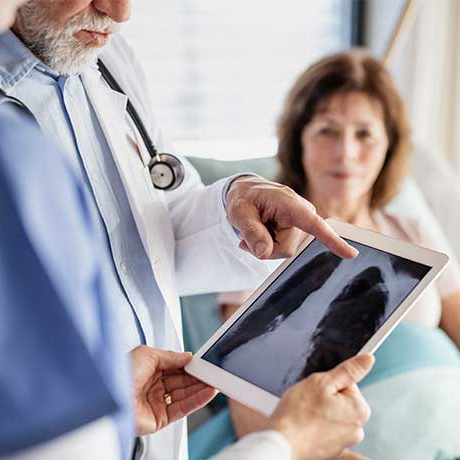Bridging the Healthcare Gap
Wednesday, 19 July,2023
Access to healthcare is a fundamental human right, yet millions of people around the world face barriers that prevent them from receiving the medical care they need. In recent years, digital platforms have emerged as powerful tools in bridging the healthcare gap and improving accessibility to healthcare services. From telemedicine to online medicine delivery and diagnostic tools, digital platforms have revolutionized the way people access healthcare. This blog explores the importance of digital platforms in facilitating global access to healthcare, highlighting their role in providing medical services, diagnostics, and overcoming geographical limitations.
Enhancing Access to Medical Services
Digital platforms have significantly improved access to medical services, particularly through telemedicine. Telemedicine allows patients to consult with healthcare providers remotely, eliminating the need for in-person visits. Through video calls or online chat, individuals can receive medical advice, prescriptions, and even follow-up consultations, regardless of their geographical location. This is particularly beneficial for individuals residing in remote areas with limited access to healthcare facilities or those with mobility issues. Telemedicine has the potential to extend healthcare services to underserved populations, improving overall accessibility and reducing healthcare disparities.
Enabling Online Medicine Delivery
Digital platforms have transformed the way people obtain medications by enabling online medicine delivery services. Through online pharmacies and e-commerce platforms, individuals can order prescription medications and over-the-counter drugs from the comfort of their homes. This is particularly convenient for individuals with chronic conditions who require regular medication refills. Online medicine delivery eliminates the need for physical visits to pharmacies, saving time and effort, and ensuring a continuous supply of essential medications. It also provides an alternative for individuals who may face transportation challenges or live in areas with limited access to pharmacies.
Empowering Self-Diagnosis and Self-Care
Digital platforms play a crucial role in empowering individuals to take charge of their own health through self-diagnosis and self-care tools. Online symptom checkers and medical information websites allow individuals to assess their symptoms, understand potential conditions, and make informed decisions about seeking medical attention. These platforms provide a starting point for individuals to educate themselves about their health concerns and seek appropriate medical help when necessary. Additionally, digital platforms offer a wide range of health and wellness applications that promote self-care, including fitness tracking, meditation, nutrition planning, and stress management. By providing these resources, digital platforms encourage individuals to engage in proactive healthcare practices and improve their overall well-being.
Facilitating Remote Medical Consultations
Digital platforms enable healthcare providers to offer remote medical consultations, expanding their reach beyond traditional brick-and-mortar clinics. Specialists can connect with patients located in different regions or even different countries, providing expert advice and guidance. Remote consultations are particularly valuable for rare or specialized medical conditions where access to local expertise may be limited. By leveraging digital platforms, healthcare providers can collaborate and share knowledge, ensuring patients receive the best possible care regardless of their location. This not only improves access to specialized medical expertise but also reduces the need for travel and associated costs.
Empowering Diagnostic Capabilities
Digital platforms have introduced innovative diagnostic tools that empower individuals to monitor their health and detect potential medical conditions. Mobile applications, wearable devices, and at-home testing kits allow individuals to track vital signs, perform self-tests, and collect relevant health data. These digital diagnostic tools enable individuals to proactively monitor their health status and share accurate data with healthcare providers for remote assessment. This capability is especially valuable for individuals managing chronic conditions or those who require regular monitoring. Digital platforms enable early detection and intervention, leading to improved health outcomes and reducing the burden on healthcare systems.
Overcoming Geographical Limitations
Digital platforms have the potential to overcome geographical limitations and improve healthcare access for remote and underserved populations. Telemedicine and digital health initiatives bring medical expertise and services directly to individuals who would otherwise face challenges in accessing healthcare due to their location. By connecting patients with healthcare providers virtually, digital platforms bridge the gap between patients and medical professionals, ensuring timely and convenient access to healthcare services. This is particularly significant in regions with limited healthcare infrastructure or areas affected by natural disasters or emergencies, where traditional healthcare delivery may be disrupted.
Addressing Challenges and Ensuring Equity
While digital platforms offer immense potential in improving healthcare access, challenges need to be addressed to ensure equity and reliability:
Digital Divide: Ensuring equitable access to digital platforms requires addressing the digital divide, including improving internet connectivity and providing access to devices for underserved populations.
Data Privacy and Security: Safeguarding patient data and ensuring privacy and security are paramount in digital healthcare. Robust data protection measures and compliance with privacy regulations are essential.
Regulatory Considerations: Developing regulatory frameworks and guidelines to govern digital healthcare platforms, telemedicine services, and online pharmacies is crucial to ensure patient safety and quality of care.
Conclusion
Digital platforms have revolutionized access to healthcare by providing convenient, cost-effective, and timely services to individuals around the world. From telemedicine and online medicine delivery to self-diagnosis tools and remote consultations, digital platforms bridge the healthcare gap and improve accessibility. By leveraging these platforms, individuals gain access to medical services, diagnostics, and information irrespective of their geographical location. However, addressing challenges related to the digital divide, data privacy, and regulatory considerations is vital to ensure equity and reliability. As technology continues to advance, digital platforms will play an increasingly crucial role in facilitating global access to healthcare, empowering individuals to take control of their health and well-being.
